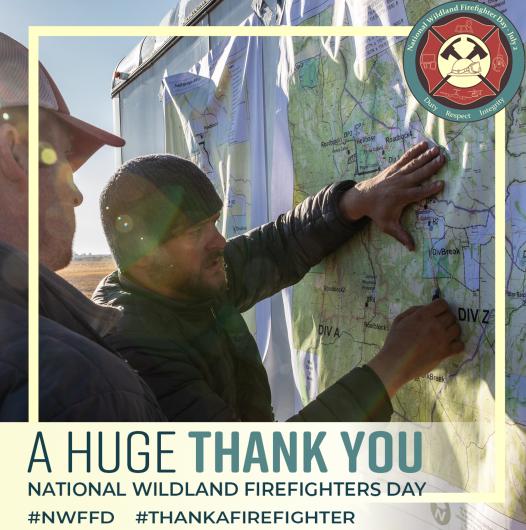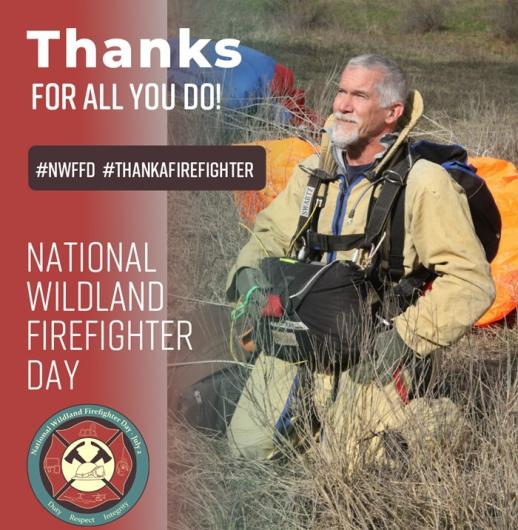Faces of wildland fire: Meet Justin Boeck and Ryan Swartz
With the approach of National Wildland Firefighter Day on July 2, we’re highlighting some of the amazing people in this community. Meet Justin Boeck, National Fire Planner for BLM Fire, and Ryan Swartz, Assistant Base Manager for BLM Fire’s Great Basin Smokejumpers, both located at the National Interagency Fire Center (NIFC).

Behind the front lines, there is a significant framework of policy governing fire management. A large part of Justin’s work is to provide guidance on these policies, with the goal of ensuring programs operate successfully and efficiently. When policy language is opaque, he helps to clarify. When new systems are rolled out, Justin provides guidance to help get users up to speed. BLM state fire planning leads are his primary contacts, although much of his work has relevance across the whole fire service and involves interagency partners.
Justin started in fire to pay for college, spending several seasons with the BLM Silver State Interagency Hotshot Crew. “It was a great college job. I paid in-state tuition in Idaho, which was pretty inexpensive back then. I didn’t have to take out any loans.” Cutting line and sawing trees every summer, he earned a master’s degree in environmental science, with a focus in fire ecology and rangeland restoration.
In the mid-aughts, Justin spent three seasons working for the National Park Service in Big Bend National Park as the crew boss for the Los Diablos Fire Crew, a unique role that he remembers as one of his favorite jobs. “You need a person with leadership quals who’s willing to live in one of the most remote places in the country, who speaks fluent Spanish. It’s not an easy job to fill.” His next job brought him to Boise, where he worked on engine crews and then spent ten years as a fire planner for the Boise District before moving into his current role in 2020.
“There’s misconceptions about firefighters. They’re not just a bunch of knuckle-draggers. They work for the public and they also work for the resource. I’ve always been passionate about the natural resource side of fire. I thought once that I’d be a resource manager, but as it turns out, fire kept me.”
“On the flip side, I hope folks in the field see that people at the national office aren’t just a bunch of suits. So many of us have extensive experience on the ground. And there’s career paths from there to here.”

Ryan’s career in wildland fire started in 1994. He worked on an engine, a rappel crew, hotshot crews, and a fire use module before his rookie season with the Great Basin Smokejumpers in 2002 (when he was 29, the oldest of his rookie cohort). Since then, he’s held every level of position on the crew, including three years as crew supervisor. 2025 marks Ryan’s 32nd fire year, and also the year of his retirement.
Ryan drove through Yellowstone National Park in 1988, an infamous time and place for wildland fire. Seeing the firefighters, Ryan was enthralled, and studied forestry at the University of Montana to prepare for a career in wildland fire. At the start of a season early in his career, he had to choose between assignments in Alaska, Florida, and Hawaii. He chose Alaska, where he first witnessed the world of smokejumping.
Ryan recalls the summer of 2006 as one of the wildest times he’s experienced. “It was a crazy summer in the Great Basin. As a crew, we did 247 missions, that’s our record. I did 20 jumps.”
Throughout his years with the crew, “It’s the camaraderie that keeps us all coming back,” he says, “Last week I was at a training and someone asked me, ‘How do you guys get such great people?’ I think the only real answer to that is that we love our jobs.”
“This kind of work is defined by variability. I’m going to be going to Wyoming this week to do some prescribed burning, I didn’t know that when I came in this morning. Dispatch might change your plans midair – you thought you were going to Oregon, but it turns out you’re going to Utah. And we love it, as long as we’re going to go jump somewhere. We trained hard to be here and we want to go do it.”
“I keep thinking, do I really want to stop? Maybe I should go another three years? But there’s a lot of other things I want to do, and I can’t take leave in the middle of the summer. It’s not how we do things. I’ll just be thinking about what I’m missing at work.”
“Honestly, I can’t believe they paid me to do what I’ve done for the last 31 years. I can’t imagine what I would have done with my career, if not this.”
Join us in congratulating Ryan on his well-earned retirement and best wishes for his next chapter.
Rebecca Paterson, Public Affairs Specialist
Related Stories
- Strategic fuel break prevents wildfire spread across U.S.–Mexico border
- Progress on Public Lands: BLM 2025 Trump Administration Accomplishments | January 20 - December 31, 2025
- BLM Fire Team brings Smokey Bear to Kingman’s Street of Lights
- Rural wildland firefighting partners grateful for BLM gift
- BLM hosts fire investigation training course to strengthen wildland fire investigation capacity across Arizona and the West
